 Petzlover
Petzlover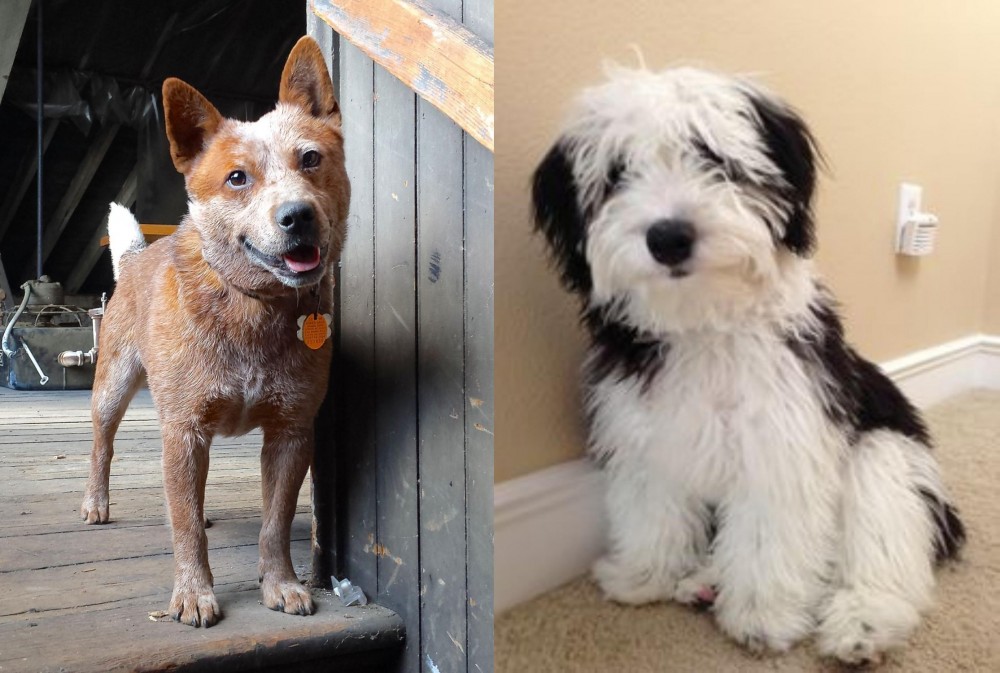 Red Heeler is originated from Australia but Mini Sheepadoodles is originated from United States. Both Red Heeler and Mini Sheepadoodles are having almost same height. Both Red Heeler and Mini Sheepadoodles are having almost same weight. Both Red Heeler and Mini Sheepadoodles has same life span. Both Red Heeler and Mini Sheepadoodles has almost same litter size. Red Heeler requires Low Maintenance. But Mini Sheepadoodles requires Moderate Maintenance
Red Heeler is originated from Australia but Mini Sheepadoodles is originated from United States. Both Red Heeler and Mini Sheepadoodles are having almost same height. Both Red Heeler and Mini Sheepadoodles are having almost same weight. Both Red Heeler and Mini Sheepadoodles has same life span. Both Red Heeler and Mini Sheepadoodles has almost same litter size. Red Heeler requires Low Maintenance. But Mini Sheepadoodles requires Moderate Maintenance
 Known also as the Australian Cattle Dog, the Red Heeler is also known as the Blue Heeler. This is a breed of herding dog originally developed in Australia.
Known also as the Australian Cattle Dog, the Red Heeler is also known as the Blue Heeler. This is a breed of herding dog originally developed in Australia.
These dogs are known for their stamina and resilience with driving cattle over long distances in hot weather and across rough terrain.
It was George Eliott who developed the Red Heeler – crossing native Dingoes with Collies and other herding dogs.
In America, the breed was fully recognised in September 1980.
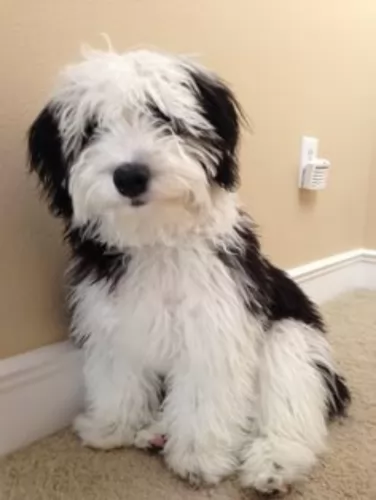 The Mini Sheepadoodle is such a sweet, teddy bear of a dog. It comes from two awesome dog breeds – the Old English Sheepdog and the Miniature Poodle. It is thought that the dog originated in the USA.
The Mini Sheepadoodle is such a sweet, teddy bear of a dog. It comes from two awesome dog breeds – the Old English Sheepdog and the Miniature Poodle. It is thought that the dog originated in the USA.
They are two very different looking dogs, but their personalities are fairly similar. This designer dog isn’t purebred and isn’t registered with the American Kennel Club (AKC).
 The Red Heeler is a medium-sized dog standing at between 43 to 51 cm in height and weighing in the region of 14 – 16 kg.
The Red Heeler is a medium-sized dog standing at between 43 to 51 cm in height and weighing in the region of 14 – 16 kg.
He is muscular, with a sturdy build. The coat of this robust dog is shortish and thick and quite often you’ll find a white star marking on he forehead. The coat is a blue-grey color or reddish. The tail of this dog is long and the ears are erect.
The Red Heeler has always been a working dog so he is energetic and lively, being independent and strong-willed.
He is super intelligent too and can be easily trained and socialized. He is a dog that simply loves the outdoors and if you don’t live on a farm, he is going to need lots of exercise.
He gets on well with kids and other pets, but children should be taught to respect him and be kind towards him, otherwise he might not tolerate them. He is a loyal, protective dog, wanting to ensure the safety of his human family.
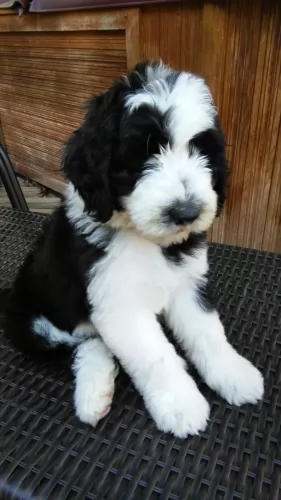 The Mini Sheepadoodle, a mix between the Mini Poodle and Sheepdog stands at between 48 and 52cm and weighs between 11 to 20kg.
The Mini Sheepadoodle, a mix between the Mini Poodle and Sheepdog stands at between 48 and 52cm and weighs between 11 to 20kg.
He is solidly built with a broad skull and face. The coat is usually medium length and can be either straight, wavy or curly. The coat can be quite a few colors depending on the parents. Some are brown, cream or black while others are white and grey or white and brown.
He is a low shedding dog. He has a double coat which will still need brushing. This hybrid breed has a thick coat that will need to be trimmed professionally every now and then as well. This is good for hot weather and for reducing the time it takes to groom the pet.
They’re easy-going, social dogs, loving to spend time with their human families. They are gentle and patient with children and they get on well with other pets in the home as well.
The Poodle is a very intelligent dog and because there is Poodle in the Mini Sheepadoodle, you can be sure that your dog is going to be bright too and that he will be able to be trained and socialized with ease. They’re friendly and don’t do too well as watchdogs.
 When you bring a Red Heeler into your home, you must know that you’re never going to have a dull moment. They’re not content to lie around with nothing to do. These popular dogs literally coax you to come out and to be active.
When you bring a Red Heeler into your home, you must know that you’re never going to have a dull moment. They’re not content to lie around with nothing to do. These popular dogs literally coax you to come out and to be active.
Red Heelers need lots of activities and lots of room, so they aren’t particularly suited to life in the city. Large properties and plenty to do is what they ask for.
Your Red Heeler is going to make a splendid pet, loyal and devoted, the perfect example of man’s best friend.
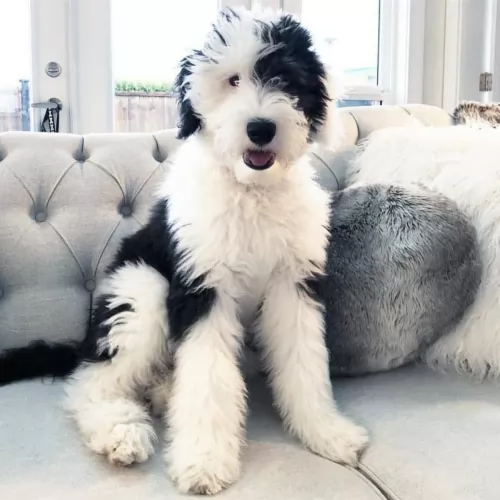 The Mini Sheepadoodle is such an affectionate teddy-bear dog and is calm, gentle and loving.
The Mini Sheepadoodle is such an affectionate teddy-bear dog and is calm, gentle and loving.
They make perfect family pets and want to please their owners. He is friendly and gets on well with his human family as well as with other pets in the home.
Children love him as he is always willing to have a game. They’re sociable and playful and make a wonderful canine pet and companion in your home.
 Your Red Heeler can live to be 15 years of age with good care. Every dog however, can fall prey to some of the many common dog diseases there are, some of which can be -
Your Red Heeler can live to be 15 years of age with good care. Every dog however, can fall prey to some of the many common dog diseases there are, some of which can be -
There are quite a lot of congenital and inherited musculoskeletal disorders in dogs, with some of the more common ones being hip dysplasia and muscular dystrophy for instance.
There are some of these musculosceletal problems which can be fatal. Some of the typical symptoms you’ll see with these problems are difficulty climbing stairs or jumping, loss of muscle mass in the hind limbs, arthritis and lameness.
The retina of the eye is that light-sensitive part and which is part of the central nervous system. With retinal degeneration, the cells decline, leading to impaired vision and sometimes even blindness.
Some symptoms to look out for include dilated pupils, night blindness and the inability to see clearly in bright light. The disease worsens over times with sudden blindness being quite common with older dogs. Your vet will want a thorough history of your dog’s health.
Other dog diseases to be very aware of are cancer, obesity, bloat, hip dysplasia and epilepsy.
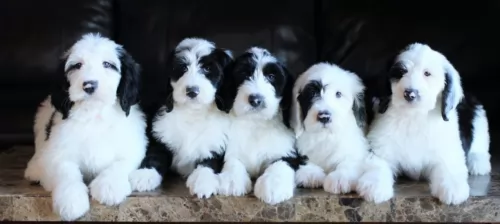 They’re healthy dogs and you’re not likely to be spending too much time at the vet. Every dog can be prone to any one of the many common dog illnesses there are. These can be hip dysplasia, obesity, bloat, dental disease, cataracts and more.
They’re healthy dogs and you’re not likely to be spending too much time at the vet. Every dog can be prone to any one of the many common dog illnesses there are. These can be hip dysplasia, obesity, bloat, dental disease, cataracts and more.
This can be a life-threatening disease and treatment will be required as soon as possible. Known also as gastric dilatation and volvulus, the stomach twists and fills with gas. The dog’s stomach becomes distended with gas, and pressure is placed on the diaphragm, creating breathing problems.
Your dog will have a swollen stomach, he’ll be drooling and panting and he’ll be restless and he may even make little whimpering noises because he is in pain. He may be trying to vomit. Your dog needs to get to the vet immediately.
This is a leading health concern with many dogs and with the Mini Sheepadoodle as well. It’s a condition where there is an abnormal formation of the hip socket. It can lead to pain and arthritis and you may even notice your once-active pet battling to do what he once did, even when he is still young.
There are things that can be done though and your vet will discuss treatment methods with you and ideas to make it comfortable for your pet.
 The Red Heeler is an active dog, and apart from walks which will give him the chance to sniff around, he will need lots of other forms of exercise. Rope pulling games he’ll love and running after a ball will please him because it takes him back to days when he used to run around and herd livestock.
The Red Heeler is an active dog, and apart from walks which will give him the chance to sniff around, he will need lots of other forms of exercise. Rope pulling games he’ll love and running after a ball will please him because it takes him back to days when he used to run around and herd livestock.
If you’re an outdoorsy type of person who loves hiking in the wilds and swimming in rivers, you can count this dog in.
You can look at the Red Heeler as a low maintenance dog. He does shed, but a good brush of the coat twice a week will be excellent for him. If he doesn’t wear his nails down naturally, you will need to trim them. Also, while you are brushing him, check his ears and eyes and inside his mouth to make sure he is clear of all infections.
Red Heelers rely on good food for their resilience and stamina, and for convenience it is good to have commercially manufactured dog food as a backup. The best is home-made food which is easy to prepare and totally uncomplicated.
Simply add into one big pot chicken, brown rice or pasta and spinach, sweet potatoes and carrots. This food can all be chopped up, refrigerated and added warmed up and in small portions to your pet's dry kibble once or twice a week. Simple and tasty, your Red Heeler will love it and thrive on it too.
Ensure there is always a bowl of fresh, cool water within his reach.
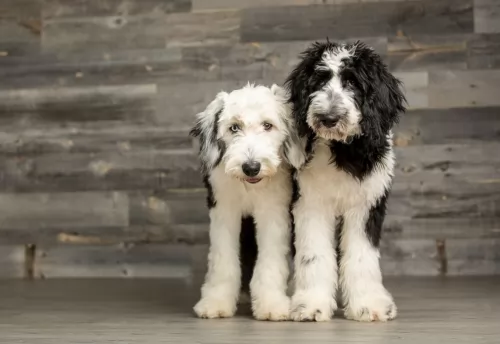 The Mini Sheepadoodles will need quite a lot of exercise as he is an active dog. Walks are always a super idea, and hikes even better. He will love other forms of activities such as ball games, hide and seek, ropes games and general rough and tumble games.
The Mini Sheepadoodles will need quite a lot of exercise as he is an active dog. Walks are always a super idea, and hikes even better. He will love other forms of activities such as ball games, hide and seek, ropes games and general rough and tumble games.
A brush every other day will be required. You can have your pet professionally trimmed. Check him over during brushing for unusual lumps. Check inside his ears and inside his mouth as he can’t tell you about ear infections or a bad tooth causing him a lot of pain.
Provide your wonderful dog with the best food there is. Just like human beings, food plays an important role in good health. Learn to read the labels on commercially manufactured dog foods and try to feed your pet natural, wholesome foods with vitamins and minerals.
Some of the more inferior brands pump their foods full of colorants and preservatives. Try and provide your Mini Sheepadoodle with some home-made food which is simple and free of spices. Things like boiled chicken, brown rice and vegetables chopped up and added to the dry kibble sometimes can do your pet a lot of good.
Make sure his vaccines are up to date and make sure you have a reliable trusted vet to turn to when he is sick.